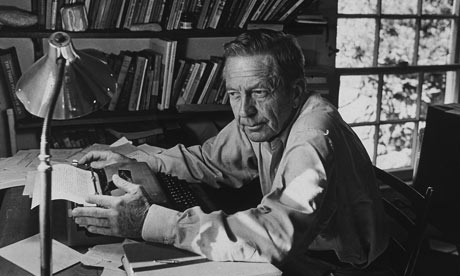From a 1979 People article about the late-life John Cheever, who was every bit as gifted at the short-story form as F. Scott Fitzgerald or Flannery O’Connor or Paul Bowles or any American writer:
Instead of whiskey, the traditional tonic of his profession, the tumbler in Cheever’s hand contains dark tea nowadays, and he distastefully yet methodically counts leftover cigarette butts in his ashtray, a requirement of Smokenders. Cheever joined because “there is something humiliating about getting off the plane in a place like Sofia and thinking, ‘Oh, my God, are they going to have my brand?'” Once tormented by phobias, Cheever required a slug of Scotch from the bottle in the glove compartment before he dared drive across a bridge. He was the despair of his publishers’ PR men, an author who disappeared for six weeks after the publication of a book and refused interviews upon returning. When his first novel was finished, he fled to Rome for a full year. Today such quirks have vanished. At 66, John Cheever is a resurrected man.
“Five years ago I was washing down Thorazine with Scotch,” he says candidly. “I felt suicidal; my life and my career were over. I wanted to end it.” Always a hard drinker, Cheever sank into alcoholism after a near-fatal heart attack in 1972. He swore off temporarily but relapsed while teaching at Boston University. Novelist John Updike, an old friend, saw him at his alcoholic nadir and sadly remarked, ‘I keep thinking the John Cheever I know is in there someplace.’ Finally, with the support of his family, Cheever faced the facts of his behavior (“such a loss of dignity”) and agreed to enter Smithers, an exclusive Manhattan clinic for alcoholism. “If you can have it cured,” he says, five years later, “I am cured.” When released after 32 days, he promptly sat down and, in less than a year, wrote his much-acclaimed fourth novel, Falconer, a gothic tale of life in a prison very much like Sing Sing. Cheever knew his subject well: He once taught a writing course to the convicts.
“I don’t know where the blackness in my life comes from,” Cheever says. “There is a great deal of sadness, of melancholy. I have no idea where it originates.” Part of it may stem from Cheever’s seafaring Yankee ancestry, and his grandfather, who, Cheever was told, committed suicide. John was born in Quincy, Mass., the son of a businessman bankrupted by the crash of ’29. His father was often away, and he and his older brother, Fred (also an alcoholic, who died in 1976), were raised by their English mother. She supported the family with a small gift shop, a source of embarrassment to Cheever. He was close to his maternal grandmother “partly because she called my mother a cretin, which is an easy way to endear yourself to a child” and remembers that she insisted French be spoken at meals. “I don’t recall her French was all that good.”•
_________________________________
Cheever’s cameo in the big-screen adaptation of “The Swimmer”:
Tags: John Cheever

